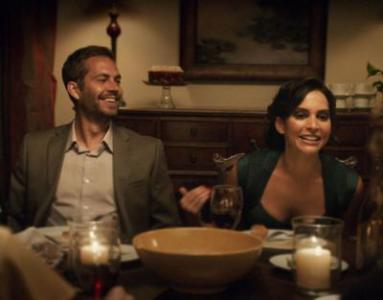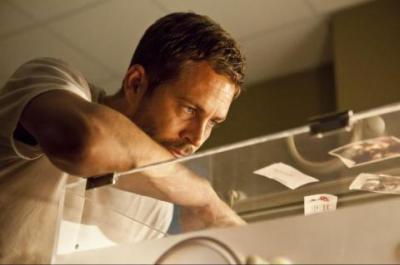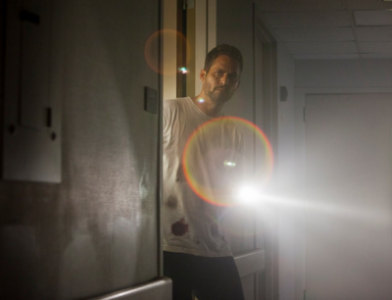By: debbie lynn elias
In what would prove to be one of his final interviews, at a press day only two weeks before his untimely death, Paul Walker sat down with myself and four colleagues to talk about one of the proudest achievements of his film career – HOURS. Walker’s mood was easy-going, jovial, animated and fun-loving. His ice blue eyes danced with excitement as he spoke about the film. His pride and joy in the work was evident in his voice and manner. Sitting next to him, watching him, listening to him, it was easy to see and feel what writer/director Eric Heisserer saw that led him to cast Paul Walker in a role that would not only demand 110% of him emotionally and physically, but put Walker on-screen in every frame of the film.

HOURS is the story of Nolan Hayes, a man trapped in an evacuated and now abandoned New Orleans hospital with his newborn daughter at the height of Hurricane Katrina. Born prematurely, the infant is put on a ventilator with 24/7 monitoring in a NIC unit. The first 48 hours are the most critical and will determine her fate. In shock over the passing of his wife during childbirth, Nolan’s first reaction towards his daughter is “I don’t know this person.” But when Katrina strikes, power is lost and the hospital is completely evacuated but for Nolan and his daughter, his paternal instincts kick in. He is the only thing, the only person, that stands between his daughter and death. With only his wits, his memories and his heart to guide him, we count down the HOURS with Nolan as he fights to save not only his daughter, but himself.
Himself a parent to a now 15-year old daughter Meadow, HOURS tapped into an emotional strength and depth not previously seen from Walker on screen. Known for his physicality and “fast and furious” action ability, for him, the realization of the “power” of HOURS hit him with the force of Katrina itself. “It was weird the way it happened because I read it and just for page value I was, ‘Wow. It’s pretty powerful.’ I was upset. I was crying. I was rooting. I was yelling at [Nolan] inside. I was feeling all these emotions. [But] I didn’t realize I was going, ‘It’s not about Nolan and a baby and this beautiful girl. This is life. And the machine is just this machine that I’ve been running for I don’t know how long and I’m just spinning it for what reason? I’m juggling all these balls and I’m just like ARGGHH!’ You’re trying to make sense of it. . . I was about two-thirds into the movie and I realized, ‘Oh my, God. This is so therapeutic’.”
Going back in time within his own mind, Walker recalled, “I started doing [acting] when I was in my early 20’s. I was like, ‘I’m a Science guy. I’m a geek. Geology and Botany and Marine Sciences. I’m supposed to be outdoors and hiking. Maybe I’m supposed to be a professional guide.’ I fought [acting] for years and years and years but at the same time, I wasn’t stupid.” It was around this time that Walker became a father. “I was like, ‘Wait a minute. I just had a child out of wedlock. Good thing I’m making another movie.’ I was going into Varsity Blues. I found out just before leaving and I was like, ‘I could put a roof over my baby’s head and then I can figure out my stuff’.” Fact became fiction when HOURS came along 15 years later. “It speaks to me in just a very pure and truthful level, but I didn’t realize [the immediate connection]. I was like, ‘This is my freaking life! This is all of our lives.’ [W]e’re running around doing what – and just cranking this stupid machine and we get flat backed. Something crazy happens to us and then you look inside the box and you go, ‘Holy shit!’”

Adding to the depth of the film and to Walker’s performance is that HOURS was shot on location in United Methodist Hospital, itself one of the hospitals decimated by Katrina which stands abandoned to this day. Thanks to growing up with a dad who was a contractor, and spending summers working for him and his buddies, Walker was well familiar with the construction and destruction of a building. “[A] lot of the buildings surrounding the hospital, you could just see the water line because they hadn’t repainted yet. On the inside, if you see a water line, you know darn well they took all the sheet-rock off the walls because they have to make sure there isn’t any mold. Black mold is nasty. . .So the base of this hospital, same thing. The water level came up almost 12 feet. So, the bottom level, when you go into work everyday, the reminder is the skeleton of the building. It’s reduced to just the aluminum and the steel. That’s the first floor. So when they do get around to reinvigorating the hospital, they just redo the lower levels and buff up what they want to buff up upstairs. . . I can’t help but think that they’re probably somewhat grateful that we sent in our crew because our standards – we’re going to be working in here immediately – those guys had to go through and clean it all out, scrubbing it. I wouldn’t want that job. But every morning getting there, it’s like, ‘Wow look at this.’ It’s really bad. It puts it in perspective. It’s a reminder every day.”

While one may think HOURS is all about emotion, take heed, as it required as much strength of body as strength of conviction given the intricacies of the plot and time limitations imposed by the now-manually operated battery keeping Nolan’s daughter alive. To immerse not only Walker but the audience in the immediacy and urgency of the situation, Heisserer used everything at his disposal within the hospital setting, much of which required Walker running from floor to floor within a time span as close to real time as possible. Reflective, Walker recalled, “I had a good balance – the physicality and the emotional component. I remember getting about midday and I’d be like, ‘Holy Hell, man! You’ve got like six hours left to go or whatever it was.” But what got Walker through the day and onto the next was the work ethic instilled in him by his father. “My father was a contractor and he made me work a different trade every summer going through high school. All of his buddies were tradesmen and my dad was like, “They can never take skill sets away from you. That’s something you’ll always have. So you’ll always be worth something because you’ll always be able to provide a certain service.’ He was smart like that. My grandfather was smart like that, too. At the end of the day you can look and go, ‘Oh look what I did!’” With that in mind, Walker was quick to note that “[With] movies you don’t have that. The film goes off in a canister. Now it’s on digital chip. There’s nothing to show from it. You leave and you go. . .’I said some things and I was trying to be cool’ but that’s about it. That’s all you have.” All that changed with HOURS. “On this one, at the end of the day, I was like, ‘Wow. That was heavy.’ I experienced some stuff today. I felt some things. I was connected with Genesis [Rodriguez]. . .It was reinvigorating. . .There might not be anything to show for it but there’s something to feel for it.’ So when it came to getting up in the morning to go to work the next day, I was, ‘Fuck yeah!’ I was ready to go.”
Having had a chance to see the final cut of HOURS before his passing, Walker was his own harshest critic. “[W]hen I watch myself, I just have bullshit meter on the whole time. I can tell when I’m telling the truth and when I’m in the moment and when I’m not. . .[T]he second that I don’t believe myself, I hate it. This one, honestly, I sat down, I was like, ‘I told the truth’.”
#
11/14/2013











